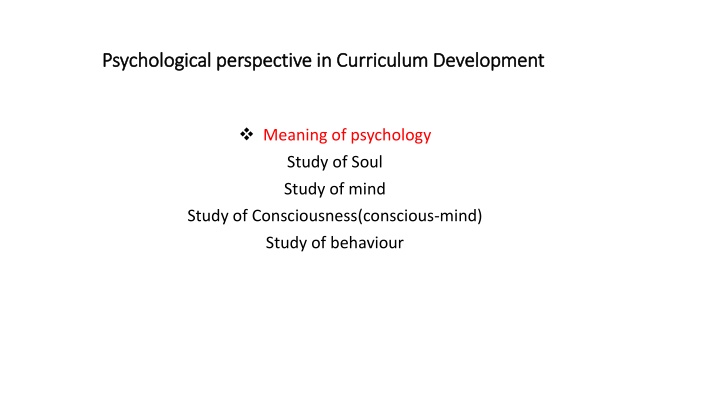
Psychological Perspectives in Curriculum Development and Learning Theories
Explore the significance of psychological perspectives in curriculum development, covering Behaviorism, Cognitivism, Constructivism, and Humanism. Delve into learning theories like classical conditioning and operant conditioning by Watson, Pavlov, and Skinner. Understand how cognitive development influences curriculum design and student learning experiences.
Download Presentation

Please find below an Image/Link to download the presentation.
The content on the website is provided AS IS for your information and personal use only. It may not be sold, licensed, or shared on other websites without obtaining consent from the author. If you encounter any issues during the download, it is possible that the publisher has removed the file from their server.
You are allowed to download the files provided on this website for personal or commercial use, subject to the condition that they are used lawfully. All files are the property of their respective owners.
The content on the website is provided AS IS for your information and personal use only. It may not be sold, licensed, or shared on other websites without obtaining consent from the author.
E N D
Presentation Transcript
Psychological perspective in Curriculum Development Psychological perspective in Curriculum Development Meaning of psychology Study of Soul Study of mind Study of Consciousness(conscious-mind) Study of behaviour
Understanding learning- Gardner .M The term learning covers every modification in behaviour to meet environmental needs. Kingsley Learning is the process by which behaviour is originated or changes through practice or training. The behaviour of an individual is changed through direct or indirect experiences , this change in behaviour brought about by experience is commonly known as learning.
Psychological Perspective influencing curriculum- Behaviourism and curriculum Cognitivism and curriculum Constructivism and curriculum Humanism and curriculum
Behaviourism and curriculum Behaviourism and curriculum Study of behaviour which can be observed Stimulus Response (S) (R) Edward L. Thorndike defined three laws of learning- Law of readiness Law of exercise Law of effect (result) It is significant that all three laws of learning are important during formation of course or curriculum construction.
Watson and Pavlov theory of classical conditioning. Watson and Pavlov theory of classical conditioning. Natural stimulus Natural response Artificial stimulus Natural response This theory has educational implication because fear, love and hatred towards the subjects are created through conditioning. Remedies Use of audio-visual aids. Sympathetic treatment towards the students. Sense of appreciation etc are significant in education.
Skinner operant conditioning theory- Need of reward and punishment Positive reinforcement Negative reinforcement Cognitivism and curriculum Cognitive or mental development- The process of the cognitive growth and development is responsible for the development of an individual s all cognitive, mental or intellectual abilities like sensation, perception, imagination, memory, reasoning, understanding, intelligence, generalization, language ability, conceptual ability, problem solving and decision making ability etc. These abilities are interrelated and never develop in isolation.
The great psychologist Jean Piaget developed the theory of cognitive development. He defined four stages of growth and development, these are- Sensori motor stage(from birth to 2 years) Pre-operational stage( from 3 to 6 years) Concrete operational stage (from 7 to 11 years ) Formal operational stage( from 12 to 15 years)
Piaget theory provides valuable information and advice on curriculum planning and structuring the scheme of studies. It is very important that curriculum must be framed according to mental capacity of the students because a child s mental development is confined to a particular age. In other words, an ideal curriculum should provide the appropriate experiences at the proper time. For example, it is not necessary to teach the students world geography in first and second standard as at that age they have not yet acquired the necessary concept like, country, state or even city. Therefore, it is more important to teach them local geography such as their neighbourhood, school, classroom and so on. Similarly, teaching algebra to the students of fourth or fifth standard is not logical children of this age may not have acquired the ability to deal with abstraction. Piaget s theory may be help in this direction by providing a suitable framework of the learning experiences in view of the cognitive development of the children and the needs of the society.
Constructivism and curriculum- Constructivism is the theory that says learners construct knowledge rather than just passively take in information. As people experience the world and reflect upon those experiences, they build their own representations and incorporate new information. Learning is active reconstruction and re-interpretation of experience. Learner constructs knowledge using- Previous knowledge Newly assimilated experience Newly developed insights.
In constructivist theory learners initiative is accepted and encouraged. The learners are actively involved, the environment is democratic and the activities are interactive and student centred. Emphasis is given on social and communication skills, collaboration and exchange of ideas. Humanism and curriculum- Humanistic curriculum is student centred approach which focuses on developing students whole personality. Humanistic curriculum aims to develop interpersonal skills. It also seeks to foster independent judgement, emotional and intellectual wellbeing and personal growth. The humanistic psychologists are- Abraham Maslow and Carl Roger. students self-concept and They believe that all humans are unique beings and that is why they should be recognized through education. It focuses on people s strengths and innate ability.
Maslows theory provides valuable insights into understanding and addressing students needs which can greatly impact in their motivation, engagement and overall well-being in the educational setting.
